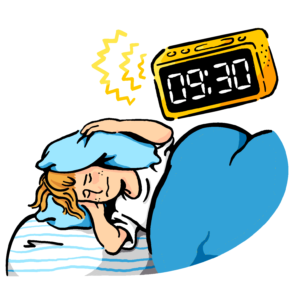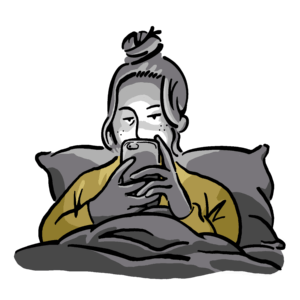“Crap!!”
This was something I said way too often every morning at the dorm as I hit snooze too many times again.
I had an exam at 8 AM and got up at 7:30. I had a 15-minute walk/run to class and my roommate was in the shower, so I guess that wasn’t going to happen until later.
I threw everything in my bookbag, grabbed a granola bar for my “good, healthy breakfast” like you’re supposed to have before an exam, and ran to my exam.
With next to no sleep and zero caffeine to wake me up, I went through the test not knowing what day it was let alone what chapters the test was even over.
College for me felt like a constant game of catch-up, as I was always sleep deprived and fighting brain fog. Looking back on what I could have done differently, I want to help you avoid the same mistakes that I made too many times to count.

Jumping right out of bed is great, but if you’re going to bed super late, it isn’t really going to help much.
Let’s look at some nighttime tips will change the way you feel on a daily basis, allowing you to feel refreshed and energized every day.
Keep Electronics Out Of Your Bedroom

Let’s jump into the main one that I know most Gen Z and Millennials struggle with the most: lying in bed glued to your phone like a brain-dead zombie late at night, and next thing you know it’s 4 AM.
Scrolling through videos can cause you to lose track of time and ruin your chance for a good night’s sleep. Plus, when you are actually ready to go to bed, the bright screen has kept your brain engaged and active. This makes it hard to fall asleep once you are ready for bed.
To avoid these problems altogether, don’t keep electronics in your sleep space. If you are in a dorm, make sure that you have a designated space out of arm’s reach to keep it so that you aren’t tempted.
Avoid Caffeine At Least 8 Hours Before Bed
Most students have an IV of caffeine constantly running through them.
Whether it is an energy drink or your favorite coffee, if you are constantly living off caffeine, it is going to be hard to fall asleep before bed.
The Sleep Foundation recommends avoiding caffeine at least 8 hours before bed to make sure you get the best quality of sleep. Obviously, caffeine affects everyone differently. If you are unsure if caffeine is the reason you struggle to get enough sleep, following this guideline is a great place to start.
You need 7-9 hours of sleep to be at your best and avoid daytime drowsiness. If you plan to allow enough time to be well-rested, chances are you won’t need that much caffeine to get you through the day.
I know that afternoon Starbucks Pumpkin Spice latte may feel like a great reward after a hard day of classes, but remember to do your future self a favor!
Make Your Bedroom A Safe Space

This idea is one that I wish someone had told me sooner when I first started college. I used to love doing my homework and taking online exams from the comfort of my bed.
If I didn’t have to be in a classroom setting why not be as comfortable as possible, right?
Constantly rushing for deadlines and taking overwhelming exams while seated in bed made my bedroom feel like an anxious space.
The anxiety from class followed me to bed, making it harder to sleep.
To avoid this, make sure you work on your exams and homework in a study room or at your desk in your room. This way, stress stays at school and your bed stays a calm place where you can relax.
Find A Nighttime Routine For Yourself
The last way that I have found to be a great help with getting quality sleep at night is creating a routine that you follow before bed.
No matter what the routine looks like, as long as you follow it as much as possible, your brain will start to associate those tasks with sleep.
This will help you to fall asleep faster once you are ready to head to bed, making the time you spend asleep even more well-rested.
Obviously, there are so many different ways to get more sleep, but these are a great way to get started if you are constantly struggling for good sleep.
If you begin implementing these today, you are sure to see a drastic improvement in your grades and the brain fog will disappear before you know it!
Good luck, and happy studying!
— Alex

